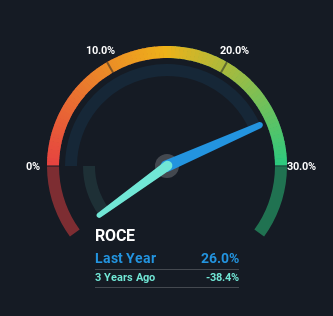- United Kingdom
- /
- Professional Services
- /
- AIM:RTC
Returns On Capital Signal Tricky Times Ahead For RTC Group (LON:RTC)
To find a multi-bagger stock, what are the underlying trends we should look for in a business? One common approach is to try and find a company with returns on capital employed (ROCE) that are increasing, in conjunction with a growing amount of capital employed. Put simply, these types of businesses are compounding machines, meaning they are continually reinvesting their earnings at ever-higher rates of return. Looking at RTC Group (LON:RTC), it does have a high ROCE right now, but lets see how returns are trending.
Return On Capital Employed (ROCE): What Is It?
For those that aren't sure what ROCE is, it measures the amount of pre-tax profits a company can generate from the capital employed in its business. Analysts use this formula to calculate it for RTC Group:
Return on Capital Employed = Earnings Before Interest and Tax (EBIT) ÷ (Total Assets - Current Liabilities)
0.26 = UK£2.7m ÷ (UK£22m - UK£12m) (Based on the trailing twelve months to December 2023).
So, RTC Group has an ROCE of 26%. In absolute terms that's a great return and it's even better than the Professional Services industry average of 19%.
View our latest analysis for RTC Group

Historical performance is a great place to start when researching a stock so above you can see the gauge for RTC Group's ROCE against it's prior returns. If you'd like to look at how RTC Group has performed in the past in other metrics, you can view this free graph of RTC Group's past earnings, revenue and cash flow.
What Can We Tell From RTC Group's ROCE Trend?
When we looked at the ROCE trend at RTC Group, we didn't gain much confidence. To be more specific, while the ROCE is still high, it's fallen from 37% where it was five years ago. However, given capital employed and revenue have both increased it appears that the business is currently pursuing growth, at the consequence of short term returns. And if the increased capital generates additional returns, the business, and thus shareholders, will benefit in the long run.
On a side note, RTC Group has done well to pay down its current liabilities to 53% of total assets. So we could link some of this to the decrease in ROCE. Effectively this means their suppliers or short-term creditors are funding less of the business, which reduces some elements of risk. Some would claim this reduces the business' efficiency at generating ROCE since it is now funding more of the operations with its own money. Keep in mind 53% is still pretty high, so those risks are still somewhat prevalent.
The Bottom Line On RTC Group's ROCE
While returns have fallen for RTC Group in recent times, we're encouraged to see that sales are growing and that the business is reinvesting in its operations. Furthermore the stock has climbed 77% over the last five years, it would appear that investors are upbeat about the future. So should these growth trends continue, we'd be optimistic on the stock going forward.
RTC Group does have some risks, we noticed 4 warning signs (and 1 which makes us a bit uncomfortable) we think you should know about.
RTC Group is not the only stock earning high returns. If you'd like to see more, check out our free list of companies earning high returns on equity with solid fundamentals.
New: AI Stock Screener & Alerts
Our new AI Stock Screener scans the market every day to uncover opportunities.
• Dividend Powerhouses (3%+ Yield)
• Undervalued Small Caps with Insider Buying
• High growth Tech and AI Companies
Or build your own from over 50 metrics.
Have feedback on this article? Concerned about the content? Get in touch with us directly. Alternatively, email editorial-team (at) simplywallst.com.
This article by Simply Wall St is general in nature. We provide commentary based on historical data and analyst forecasts only using an unbiased methodology and our articles are not intended to be financial advice. It does not constitute a recommendation to buy or sell any stock, and does not take account of your objectives, or your financial situation. We aim to bring you long-term focused analysis driven by fundamental data. Note that our analysis may not factor in the latest price-sensitive company announcements or qualitative material. Simply Wall St has no position in any stocks mentioned.
About AIM:RTC
RTC Group
Through its subsidiaries, provides recruitment services in the United Kingdom, the United States, and the Middle East.
Flawless balance sheet established dividend payer.
Similar Companies
Market Insights
Community Narratives



